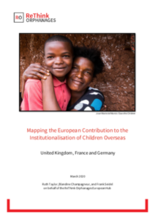EXECUTIVE SUMMARY International volunteering is widely understood to have originated primarily in Western Europe, specifically the United Kingdom, before the trend expanded to other parts of the world with similar demographics, for example Australia and the United States. Today, significant anecdotal evidence suggests that other countries across Europe also make a considerable contribution to the supply chain of people, money and resources that continue to sustain and foster the orphanage industry worldwide. However, there is a lack of data available to accurately assess the extent of this contribution. As the linkages between the growth in the number of orphanages worldwide and the booming orphanage volunteering business become more apparent, more attention needs to be given to European countries and the role they play in the institutionalisation of children overseas.
This report seeks to map the contribution of the three countries in Europe with the largest volunteer travel markets: The United Kingdom, Germany and France. For each country, a number of sectors have been considered and opportunities for further engagement have been identified. The format of this report follows a previously published ReThink Orphanages Australia report that engaged in a similar mapping exercise. This mapping report should be seen as a starting point, identifying areas that start to shed light on a large problem, but also to point to gaps in data, and the continued confusion in terminology and classification of orphanage volunteering trips which make data collection challenging. Acknowledging the data gaps that currently exist, the report will be reviewed one year after publication.
Much of the attention, particularly in France and Germany, has focused on short-term trips operated by volunteer for-profit organisations, while all other sectors providing orphanage tourism experiences (notfor-profit volunteer organisations, faith groups, educational institutions, tourism operators, both traditional and those operating in “sustainable tourism”) have largely been absent from the debate. The few examples where organisations have changed and no longer support orphanage volunteering, have mostly been achieved with volunteer for-profit organisations, while a significant proportion of the other volunteering and tourism organisations continue to regularly offer orphanage trips, including volunteer opportunities. To make more progress on this debate, we need to better clarify the message and broaden the debate to include all kinds of volunteering regardless of the legal status of the enabling organisation or the length of volunteer stays.
While the European Union has promoted deinstitutionalisation in many ways, particularly by supporting the shift from institutional to community-based care through EU funding, this direction of travel has not filtered into the volunteering space. In both France and Germany, there are still many governmentfunded programmes that support orphanage volunteering. Specifically working to exclude orphanage volunteering from government funded programmes would help to 1) stop public funds being used to support orphanages, 2) increase the debate amongst those that receive a mixture of government funding with private funding, and 3) engage faith communities, especially in France and Germany, many of which also benefit from government funded programmes.
Faith communities across Europe are very involved in supporting orphanages overseas. However equally importantly, many are also interested in supporting families and communities. More work needs to be done on how best to shift their giving and developing case studies as examples of how to do this appropriately in the best interests of children. Some have compared this shift to the debate on child sponsorship which shifted from supporting individual children to supporting or sponsoring a community.
Given the popularity and movement to promote volunteering by young people and students, particularly in the United Kingdom, clear guidance across Europe on how to choose ethical and sustainable placements should be readily available.
Many sending organisations have very little direct contact with the host country, thus an additional area of research should be focused on the role of incoming agencies, those that serve as a host to volunteering “sending organisations” and working to help them to ethically and gradually divest from orphanage volunteering.

